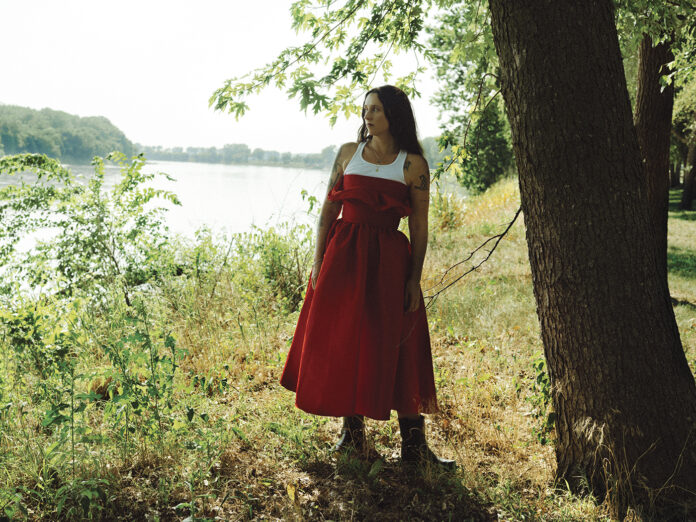Over the past decade and a half, Katie Crutchfield has amassed a deep catalogue of quiet revelations, full-band exorcisms and adventurous collaborations, but it took until now for her to write her first love song. It’s called “Right Back To It”, and it’s the immediate standout of her grounded and radiant new album. “You just settle in/Like a song with no end,” she sings in close harmony with MJ Lenderman, the North Carolina songwriter and guitar of the alt.country band Wednesday, whose tender drawl seems to wrap its arms around Crutchfield’s distinctive, cawing voice. In the background, you hear the melodic pluck of a banjo and a slow-moving drumbeat, all propelling one of Crutchfield’s most satisfying, singalong choruses. It’s not just Waxahatchee’s first love song: it’s the first one you can imagine playing on pop radio.
Over the past decade and a half, Katie Crutchfield has amassed a deep catalogue of quiet revelations, full-band exorcisms and adventurous collaborations, but it took until now for her to write her first love song. It’s called “Right Back To It”, and it’s the immediate standout of her grounded and radiant new album. “You just settle in/Like a song with no end,” she sings in close harmony with MJ Lenderman, the North Carolina songwriter and guitar of the alt.country band Wednesday, whose tender drawl seems to wrap its arms around Crutchfield’s distinctive, cawing voice. In the background, you hear the melodic pluck of a banjo and a slow-moving drumbeat, all propelling one of Crutchfield’s most satisfying, singalong choruses. It’s not just Waxahatchee’s first love song: it’s the first one you can imagine playing on pop radio.
DAVID BOWIE IS ON THE COVER OF THE LATEST UNCUT – ORDER YOUR COPY HERE
This gift for immediacy has always hidden in the subtext of Crutchfield’s music. On her early, home-recorded releases, the Birmingham, Alabama-born artist stood apart from fellow DIY songwriters with a peculiar gift for melody and lyrics that burrow deep under the skin (“I don’t believe that I care at all/What they hear through these walls,” went a pivotal early couplet). After building on the word-of-mouth success of her intimate 2012 debut, American Weekend, and heavier fare like 2017’s Out In The Storm, Crutchfield hit a breakthrough with 2020’s lush Saint Cloud. Upon settling in Kansas City after leading an itinerant lifestyle the preceding decade, that release marked her first collaboration with producer Brad Cook, as the lyrics documented her journey to sobriety and the palpable glow of a new, stable relationship with Kevin Morby.
Tigers Blood continues that trajectory, pairing her once again with Cook and exploring new intricacies in the subject matter of tentative, hard-won contentment – a precarious spot she describes early in the record as “the final act of the good old days”. As evidenced by that lyric, Crutchfield has a knack for countering every moment of peace with a light dose of anxiety. Or, as she confesses in the resplendent opener “3 Sisters”, “I make a living crying it ain’t fair/And not budging.” Luckily, she’s assembled a group of collaborators who know precisely how to linger in the sunlight. Lenderman is a welcome presence, offering both his plainspoken harmony and his deceptively fragile, Southern-rock guitar licks that make standouts like “Crowbar” sound beamed in from a dusty roadhouse jukebox. On drums, Spencer Tweedy offers a light touch that offsets the sturdy, Springsteenian heartland rock of “Bored” and the slow-building waltz-time title track. Elsewhere, multi-instrumentalist Phil Cook fills the background with touches of dobro, banjo and organ.
Describing Tigers Blood as Waxahatchee’s pop album is something of an overstatement, especially after the bright, embracing sound of Saint Cloud and Crutchfield’s work alongside singer-songwriter Jess Williamson in the country-rock duo Plains. But what unites this dynamic group of songs is their ability to aim directly at the pleasure centres of big choruses, guitar parts as catchy as the vocal hooks, and lyrics that filter universal themes through a memorably idiosyncratic lens (describing musicians’ fate in the streaming economy as “reading fortunes for free in someone else’s goldmine” might go down as one of the year’s most astute pieces of entertainment journalism). Having long cited Lucinda Williams as an inspiration for her gritty, observant Southern storytelling, in these songs Crutchfield seems equally attuned to the songwriter also capable of starry-eyed crowd-pleasers like “Passionate Kisses”.
Take, for example, “Lone Star Lake”, where a well-placed “baby” in the second verse adds a sense of old-school tenderness that complements the otherwise hyper-specific details (see: rhyming “turkey wheat” with “’Bama heat”). Crutchfield’s years spent earning her stripes among the DIY punk venues of Philadelphia remains evident in her ability to fashion these songs, even at their most quiet and threadbare, into anthems: music you’ll want to shout along with from the heart of the crowd. In fact, she replicates this very sensation to close the record. In the final chorus of the title track, she orchestrates a round of vocalists to sing alongside her, their voices blending together and elevating the words into something like gospel. She has learned by now how transcendent her music can feel when it’s larger than any one voice.
Accordingly, Crutchfield knows just when to pare things back. The acoustic ballad “365” is as spare and simple as things get on Tigers Blood – for the percussion, Tweedy is credited with playing only a cymbal and a “cedar plank”. And in the words, Crutchfield once again adopts the language of love songs to make a pledge that could be equally resonant for someone in a committed relationship or, on the darker side, struggling with a lifelong dependency. “When you fail, I fail/When you fly, I fly,” she sings. “And it’s a long way to come back down.” Accompanying herself with high, creaking harmonies mixed low in the background, she gives the sense of someone looking at a long road ahead. While Waxahatchee has never sounded more suited for sprawling crowds and mass approval, Crutchfield has never seemed truer to herself.



